|
|
|
Sort Order |
|
|
|
Items / Page
|
|
|
|
|
|
|
| Srl | Item |
| 1 |
ID:
134042
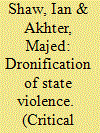

|
|
|
|
|
| Publication |
2014.
|
| Summary/Abstract |
This article explores the shifting methods of U.S. state violence. Building on their earlier work, the authors focus on the use of drones for targeted killings in Pakistan, but here they tease out the wider implications for the future of "warfare"-particularly the meaning and extent of sovereignty and territory. The authors argue that drone strikes both emerge from and feed back into a series of evolutions in the nature of state violence, centered on the intensely bureaucratic and automated delivery of death. This technopolitical transformation, they contend, is underwritten by the abandonment of "thought" and the ascendance of what Hannah Arendt calls an unaccountable "rule by nobody." To build this argument, the authors investigate the institutional conditions of modern-day drone strikes, moving historically and geographically to the birth of the Predator drone and the rise of the CIA in 1980s Afghanistan. By studying nonhuman sources of power, the authors argue that today's planetary manhunt exceeds any direct human control. They conclude by exploring the "individualization" of targeting and its likely consequences for war and law enforcement.
|
|
|
|
|
|
|
|
|
|
|
|
|
|
|
|
| 2 |
ID:
119921
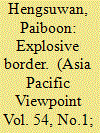

|
|
|
|
|
| Publication |
2013.
|
| Summary/Abstract |
The Salween borderlands can be conceptualised as spaces of exception where contradictory outcomes of state actions lead to state violence. The Burmese and Thai states have maintained their sovereign power and responded to economic regionalisation through violent practices in particular spaces. The political conflicts between the Burmese junta and ethnic minorities in the Salween borderlands have become war zones. The Burmese government in association with the Thai state and transnational dam investors has imposed the Salween dam projects on the Salween borderlands and people in the form of a terrorising state. The border people have experienced fear, danger and military violence, which has become part of the violence in everyday life. This paper provides an ethnographic study focused on specific events involving an explosion and death in a particular place and time on the Salween borderland. It shows the suffering of the border people in relation to sovereign power.
|
|
|
|
|
|
|
|
|
|
|
|
|
|
|
|
| 3 |
ID:
185081


|
|
|
|
|
| Summary/Abstract |
Taking the Capitol riots of January 6 as a point of departure, this article queries the utility of abject white violence to the US security state through a focus on the latest push for domestic terrorism legislation. Drawing on the first-ever National Strategy for Countering Domestic Terrorism released by the White House in June 2021, we trace how the US security state constructs white supremacist violence as both abject and anachronistic, a creative project of history-making through which the liberal security state operationalizes that violence to bolster and expand US empire and counterinsurgency. Further, we explore how the fungibility of abject whiteness within contemporary US counterterrorism creates a metonymic power by which the foreign and domestic cohere, collapse, and diverge through the figure of the racialized terrorist to suit the needs of the imperial state. While the state’s current push for domestic terrorism legislation publicly portrays a stance of historical reconciliation and multicultural protectionism, the figure of the domestic terrorist functions as a conduit through which the violence of the state is rerouted. Through this vision of besieged multiculturalism, the liberal security state seeks to creatively refashion US empire domestically and at the global scale.
|
|
|
|
|
|
|
|
|
|
|
|
|
|
|
|
| 4 |
ID:
139443
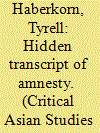

|
|
|
|
|
| Summary/Abstract |
There were two, not one, amnesty laws passed in relation to the 6 October 1976 massacre at Thammasat University and coup in Thailand. The first amnesty law, passed on 24 December 1976, legalized the coup and prevented those who created the conditions for the coup and seized power on the evening of 6 October from being held to account. The second amnesty law, passed on 16 September 1978, freed eighteen student activists still undergoing criminal prosecution and dismissed the charges against them. Although neither amnesty mentioned the massacre, the urgency of producing and then safeguarding impunity for the state and para-state actors behind the violence at Thammasat was the absent presence in both laws. Combining a close reading of both laws with examination of archival documents about the drafting of the first amnesty law and court and other records related to the second, this article uncovers the hidden transcripts of both amnesty laws as a point of departure for examining questions about impunity, law, and history. First, what are the legal mechanics through which violent actors escape accountability? Second, what are the legal and political functions of amnesty when no crime has been committed? Third and finally, might accountability for past violence be possible, and if so, under what conditions? The answers to these questions illuminate how impunity was produced in the specific case of the 6 October 1976 massacre in Thailand as well as address broader concerns about impunity's role in state formation.
|
|
|
|
|
|
|
|
|
|
|
|
|
|
|
|
| 5 |
ID:
064698
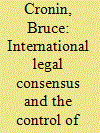

|
|
|
|
|
| Publication |
Jul-Sep 2005.
|
|
|
|
|
|
|
|
|
|
|
|
|
|
|
|
| 6 |
ID:
161142
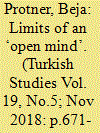

|
|
|
|
|
| Summary/Abstract |
The history of Turkey, as experienced by its minority populations, is characterized by instances of demographic and topographic engineering, war, dispossession, and political violence. Rather than being single historical events, these are longue durée systematic processes of Turkification that have continuity with contemporary political arrangements and privileges, despite the fact that the notion of Turkishness has been continuously changing. This article reflects on ethnographic research and interviews with liberal Turkish university students in Istanbul about the Turkish–Kurdish conflict, conducted during a time of relative peace and political optimism. It discusses Turkish liberals’ silencing of state violence and denial of privilege constituted through violence. This ‘forgetting’ is conceptualized as a continuous investment in Turkishness, which involves complicity. Such analysis of belonging might help to explain today’s lack of political mobilization and solidarity between the Kurdish movement and opposition groups in the present time of growing political oppression.
|
|
|
|
|
|
|
|
|
|
|
|
|
|
|
|
| 7 |
ID:
144804
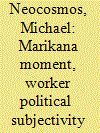

|
|
|
|
|
| Summary/Abstract |
The flag suits the filthy landscape, and our jargon drowns the sound of the drum.
In the interior we shall nourish the most cynical prostitution. We shall massacre all logical revolts. To the spicy, softened countries! – At the service of the most monstrous industrial or military exploitation. Until we meet again; here, no matter where. Conscripts of our good will, we shall have a ferocious philosophy; ignorant of science, cunning for comfort; let the rest of the world perish. This is the real way forward; full march ahead! (Rimbaud, 1986)
|
|
|
|
|
|
|
|
|
|
|
|
|
|
|
|
| 8 |
ID:
163739
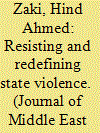

|
|
|
|
|
| Summary/Abstract |
For decades, thousands of Tunisian women suffered from systematic sexual violence at the hands of state agents, with many now seeking justice and public recognition of those crimes following the 2011 Jasmine revolution. While Tunisia’s process of transitional justice created an opportunity to construct new narratives of women's rights, it paradoxically created more barriers to holding the state accountable for its violations, mainly because of the centrality of the state hegemonic narratives of women’s rights in the legal and political process of transitional justice. In this article, I investigate the limitations and gendered paradoxes inherent in the process of transitional justice in post-revolutionary Tunisia. Focusing on the Truth and Dignity Commission established in 2014, I explore how gender-based violence featured into the formal procedural mechanisms of transitional justice, and the degree to which women’s voices were incorporated into the making of the rules and procedures related to providing compensations and rehabilitation to victims of gender-based violence. Furthermore, I analyze how official narratives of gender-based violence committed by the state enforced traditional gendered categories, perpetuating the state's prerogative powers over its citizens and reflecting the requirements of Tunisia's fragile political settlement. Through such an approach, I hope to develop a deeper understanding of the role that nationalist narratives on women’s rights play in the context of transitional justice and suggest viable recommendations for building accountable state institutions that could effectively address gender inequality as an essential goal of democratic governance.
|
|
|
|
|
|
|
|
|
|
|
|
|
|
|
|
| 9 |
ID:
164489
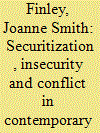

|
|
|
|
|
| Summary/Abstract |
In the Introduction to this special issue, I first provide an overview of the programme of 'de-extremification' and mass internment in Xinjiang since early 2017. I then situate this development against the ‘ideological turn’ in Chinese Communist Party policy under President Xi Jinping, highlighting the new emphasis on stability maintenance and ideational governance. Next, I explore experiences of (in)security in Uyghur communities in- and outside of Xinjiang in the era of internment to consider how far PRC counter-terrorism initiatives have now evolved into state terror. In doing so, I apply Ruth Blakeley's (2012) definition of state terror as a deliberate act of violence against civilians, or threat of violence where a climate of fear is already established by earlier acts of violence; as perpetrated by actors on behalf of or in conjunction with the state; as intended to induce extreme fear in target observers who identify with the victim; and as forcing the target audience to consider changing its behaviour. Finally, I discuss the six contributions to the special issue.
|
|
|
|
|
|
|
|
|
|
|
|
|
|
|
|
| 10 |
ID:
165899
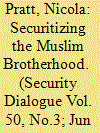

|
|
|
|
|
| Summary/Abstract |
Unprecedented levels of state violence against the Muslim Brotherhood, and the widespread acceptance of this violence by Egyptians following the July 2013 military coup, have been under-examined by scholars of both critical security studies and Middle East politics, reflecting implicit assumptions that state violence is unexceptional beyond Europe. This article explores how the deployment of such levels of violence was enabled by a securitization process in which the Egyptian military successfully appropriated popular opposition to Muslim Brotherhood rule, constructing the group as an existential threat to Egypt and justifying special measures against it. The article builds on existing critiques of the Eurocentrism of securitization theory, alongside the writings of Antonio Gramsci, to further refine its application to non-democratic contexts. In addition to revealing the exceptionalism of state violence against the Muslim Brotherhood and highlighting the important role of nominally non-state actors in constructing the Muslim Brotherhood as a threat to Egypt, the article also signals the role of securitization in re-establishing authoritarian rule in the wake of the 2011 uprising. Thus, we argue that securitization not only constitutes a break from ‘normal politics’ but may also be integral to the reconstitution of ‘normal politics’ following a period of transition.
|
|
|
|
|
|
|
|
|
|
|
|
|
|
|
|
| 11 |
ID:
074062
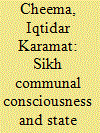

|
|
|
| 12 |
ID:
074178
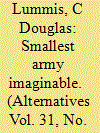

|
|
|
|
|
| Publication |
2006.
|
| Summary/Abstract |
This article explores why is so difficult to imagine a state without an army. It considers Article 9 of the Japanese Constitution, conventional accounts of the sovereign state and the right to legitimate violence, Gandhi's concept of satyagraha, Gandhi's Constitution for a Free India, and Gandhi's understanding of the art of the possible. It concludes with a reading of Gandhi and the sacrificial politics of founding in India.
|
|
|
|
|
|
|
|
|
|
|
|
|
|
|
|
| 13 |
ID:
167397
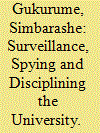

|
|
|
|
|
| Summary/Abstract |
This article examines the deployment of government spies and state security agents on a university campus in Zimbabwe and the implications this has on knowledge production at the university. The campus is presented as a socio-political space in which everyday political struggles are fought. I argue that surveillance is an intractable part of the rhythms of everyday life on campus, and a very specific form of ‘bio-power’, ‘biopolitics’ and violence meant to discipline students and lecturers, as well as the ways in which knowledge is produced and sedimented. Habitualisation of surveillance and fear of surveillance generate Foucauldian ‘panopticon’: producing ‘self-censorship’ on campus.
|
|
|
|
|
|
|
|
|
|
|
|
|
|
|
|
| 14 |
ID:
192873
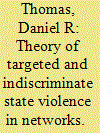

|
|
|
|
|
| Summary/Abstract |
Theories explaining why states choose to use targeted or indiscriminate violence against civilians hinge on the state’s capacity to gain information about who to target and its ability to do enough damage to prevent defection to the rebel’s side. In contrast to these theories, I show that the choice of strategy depends on the characteristics of the community experiencing the violence, not the state employing it. This article argues that even when states can target certain civilians, they may choose to employ indiscriminate violence owing to the characteristics of the civilians’ social network structure. The state’s optimal strategy of violence is driven by two factors: the degree distribution of civilians’ social networks and the correlation between citizens’ motivation to leave a network and citizens’ value to other nodes in the network. When the degree distribution is uniform, and motivation and value are positively correlated, indiscriminate violence is more often preferred.
|
|
|
|
|
|
|
|
|
|
|
|
|
|
|
|
| 15 |
ID:
158209
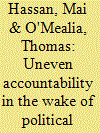

|
|
|
|
|
| Summary/Abstract |
The government faces a principal–agent problem with lower-level state officers. Officers are often expected to use the state coercive capacity endowed to them to politically benefit the government. But officers can shirk from the government’s demands. An officer’s actions during bouts of large-scale and highly visible electoral violence reveal the officer’s type, thereby providing the government with the information necessary to solve its principal–agent problem for the future. The government holds officers who used their authority to perpetuate incumbent-instigated violence accountable through positive rewards, while holding officers who used their authority to perpetuate opposition-instigated violence accountable through negative sanctions. We find evidence in support of the theory using micro-level archival data on 2,500 local officer appointments and fine-grained satellite data on the locations of violence in the aftermath of Kenya’s 2007 election. The Kenyan government was more likely to fire officials whose jurisdictions saw opposition-instigated violence that targeted government supporters. But we find the opposite result where violence was instigated by incumbent supporters: there, officers were less likely to be fired if violence occurred in their jurisdiction. Our results indicate that leaders can manipulate accountability processes after political violence to further politicize the state.
|
|
|
|
|
|
|
|
|
|
|
|
|
|
|
|
| 16 |
ID:
193486
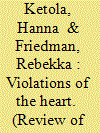

|
|
|
|
|
| Summary/Abstract |
This article examines ‘parental harm’ – a harm that occurs when a parent loses or faces the threat of losing a child. We contend that the manipulation and severing of relationships between parents and children has played a central role in war and oppression across historical contexts. Parental harm has long-term and pervasive effects and results in complex legacies for carers and their communities. Despite its grave impact, there is little research within International Relations into parental harm and understanding of its effects. We conceptualise parental harm through two frames – the ‘harm of separation’ and ‘harm to the ability to parent’ – and theorise gendered dimensions of how it is perpetuated and experienced. As such, we advance feminist understandings of family as a gendered institution that shapes the conduct of war and institutionalises racialised oppression. Our conception of parental harm offers novel insights into the relationship between intimate relations, the family, and state power and practices. We illustrate our conceptual arguments through two examples: the control and manipulation of family in antebellum slavery in the United States and the targeting of Tamil children in disappearances in Sri Lanka. These examples demonstrate the pervasiveness of parental harm across contexts and forms of violence.
|
|
|
|
|
|
|
|
|
|
|
|
|
|
|
|
| 17 |
ID:
187735
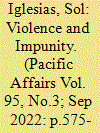

|
|
|
|
|
| Summary/Abstract |
As president from 2016 to 2022, Rodrigo Duterte captured the judiciary, dominated the legislature, attacked the media, and presided over a campaign of mass killing, leaving an estimated 30,000 alleged drug criminals dead. Despite wielding vast amounts of power, Duterte stepped down after the national elections on May 9, 2022 in a largely peaceful transfer of power to Ferdinand Marcos Jr., son and namesake of the former dictator deposed in 1986. Why did Duterte amass power without causing full democratic collapse into authoritarian rule? The Philippines experienced backsliding to competitive authoritarianism: while elections remain free and somewhat fair, other features of democracy like civil liberties and political freedoms have eroded badly because of mass violence. The Philippine case demonstrates the autocratizing effect of an emerging form of political violence: a focused campaign of state terror that produces fear and electoral success. I present evidence from two cases—the national “war on drugs” and its local antecedent in Davao City—to explain how violence escalates, provokes accountability, evades culpability, and contributes to democratic backsliding without immediate collapse to authoritarianism. With the election of Marcos Jr., the impunity of the former incumbent is likely to become institutionalized, and democratic backsliding is unlikely to be reversed.
|
|
|
|
|
|
|
|
|
|
|
|
|
|
|
|
| 18 |
ID:
112613


|
|
|
|
|
| Publication |
2012.
|
| Summary/Abstract |
Political organizations claim they are serving the interests of their constituents-but being involved in the drug trade does not seem to support those claims. Why would political organizations sell drugs then? Most often the question of why organizations engage in the drug trade has been explored in the context of organizations that are either criminal or violent, thus leaving a large hole in the literature about how violence and legality intersect with other exploratory factors. We explore this issue more fully by looking at both violent and nonviolent organizations using the Middle East Minorities at Risk Organizational Behavior dataset, which has data on over 100 ethnopolitical organizations in the Middle East. Very few of these organizations are involved in the drug trade and yet all of those are engaged in violence at the same time. We explore what factors, other than violence, make this rare behavior for political organizations more likely.
|
|
|
|
|
|
|
|
|
|
|
|
|
|
|
|
|
|
|
|
|